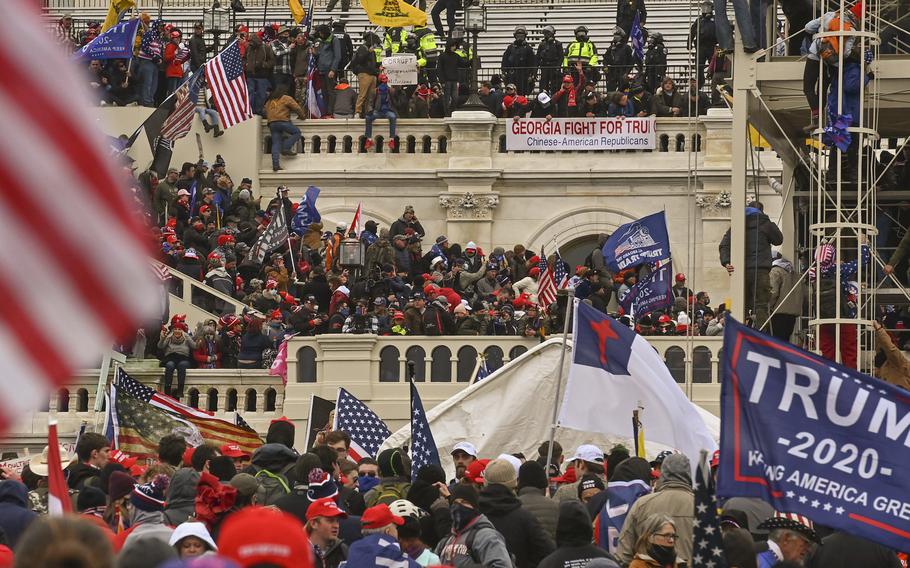
Participants in a pro-Trump mob take over the inaugural stage at the Capitol on Jan. 6. (Ricky Carioti/The Washington Post)
WASHINGTON — The House select committee investigating the Jan. 6 insurrection issued its first sweeping requests Wednesday for records from federal agencies pertaining to the attack on the Capitol and President Trump's efforts to subvert the election.
In letters demanding materials from the National Archives and seven other agencies, Bennie G. Thompson, D-Miss., the committee chairman, signaled an expansive investigation, touching not only on what happened on Jan. 6 but also materials that could shed light on matters such as "the former President's knowledge of the election results and what he communicated to the American people about the election."
Thompson gave the agencies a two-week deadline to produce materials, and asked Archivist of the United States David Ferriero to use his authority under federal regulations to swiftly address the request for records from the Trump White House.
"Our Constitution provides for a peaceful transfer of power, and this investigation seeks to evaluate threats to that process, identify lessons learned and recommend laws, policies, procedures, rules, or regulations necessary to protect our republic in the future," Thompson wrote.
The requests include information on "communications within and among the White House and Executive Branch agencies during the leadup to January 6th and on that day" as well as issues further removed, such as "attempts to place politically loyal personnel in senior positions across government after the election."
Other agencies being asked to provide information include the departments of Defense, Homeland Security, Interior and Justice; as well as the FBI, National Counterterrorism Center and Office of the Director of National Intelligence.
The violence on Jan. 6 was the most serious attack on the Capitol since the War of 1812 and was carried out by a mob of Trump supporters who echoed his false claims about the 2020 election while seeking to stop Congress's efforts to certify its results and declare Joe Biden the next president.
Democrats and Republicans have clashed over how or whether the insurrection should be investigated, with Republicans opposing creation of the select committee headed by Thompson and an earlier proposal to create an independent commission modeled on the panel that investigated the Sept. 11 terrorist attacks.
GOP leaders have offered varying reasons for their opposition to a formal investigation, including that it should also investigate violence at racial justice protests during the summer of 2020 and that Democrats’ only goal is to hurt the GOP politically ahead of the 2022 midterms by highlighting Trump's role in the event.
House Minority Leader Kevin McCarthy, R-Calif., on Wednesday blasted the committee's action, saying it underscored how its work is "more political" than a legitimate search for truth. McCarthy, who last month withdrew his appointees to the committee in protest, suggested it was chilling to look at records from lawmakers.
Among scores of other requests, the committee asked the archivist for records of communication within the White House on Jan. 6 with "any Member of Congress or congressional staff."
"They come for members of Congress, they are coming for everybody," McCarthy said, adding that he had already talked publicly about his discussions with Trump that day on three different television networks.
McCarthy and other Republicans who spoke with Trump or administration officials are potential witnesses for the committee's inquiry. The minority leader has not said whether he would appear before the panel if asked.
Some of the requests by the select committee duplicate those of other House committees that have probed aspects of the insurrection. Other requests are new and seek more granular information, and they heavily target former White House staffers and other Trump loyalists.
The committee, for example, is asking Archives to turn over all White House documents provided to Trump and his then-chief of staff Mark Meadows that refer to "a stolen election, stealing the election, or a 'rigged' election."
The committee is seeking records related to Trump's comment on Sept. 29 that the Proud Boys, a far-right group with a history of violence, "stand back and stand by" ahead of an election he had repeatedly claimed could be rife with fraud.
And the committee is seeking all "documents and communications related to any plan for the President to march or walk to the Capitol on January 6" following a rally near the White House.
The requests to other agencies seek a wide array of information about the events surrounding Jan. 6.
The committee, for example, asks the Department of Homeland Security for records on the Secret Service protection of Vice President Mike Pence and his family during the insurrection. Pence was at the Capitol during the attack as part of the process of certifying the election.
The committee seeks from the Justice Department records of communications with Trump's campaign legal team dealing with the validity of the 2020 election. And it asks the FBI for records " pertaining to intelligence gathered prior to January 6th on events that might occur on that day."
The Jan. 6 committee held its first hearing last month with visceral accounts of the Trump supporters' assault on the police officers who defended the Capitol that day and who said that the trauma and horrific attacks they sustained months ago still plagued them.
The committee is expected to hold additional public hearings after Labor Day.
Last week, Thompson said the committee was also planning to ask communications companies to preserve phone and other records that could be helpful to the investigation, including from members of Congress.
"We have quite an exhaustive list of people," Thompson said at the time. "I won't tell you who they are, but it's several hundred people that make up the list of individuals we plan to contact."
The Washington Post's Paul Kane contributed to this report.